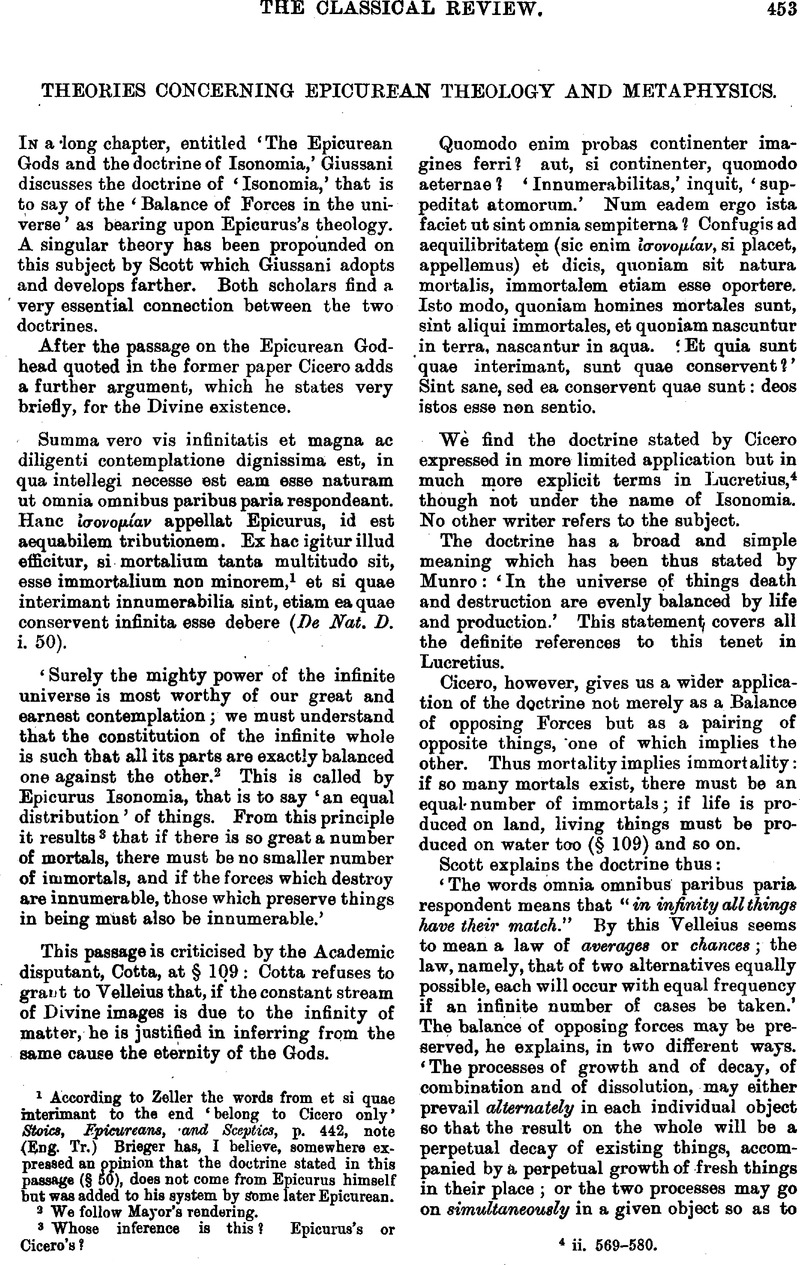No CrossRef data available.
Published online by Cambridge University Press: 27 October 2009

page 453 note 1 According to Zeller the words from et si quae interimant to the end ‘belong to Cicero only’ Stoics, Epicureans, and Sceptics, p. 442, note (Eng. Tr.) Brieger has, I believe, somewhere expressed an opinion that the doctrine stated in this passage (§ 50), does not come from Epicurus himself but was added to his system by Some later Epicurean.
page 453 note 2 We follow Mayor's rendering.
page 453 note 3 Whose inference is this? Epicurus's or Cicero's?
page 453 note 4 ii. 569–580.
page 454 note 1 J. of Philol. for 1883, pp. 222–4
page 454 note 2 Vol. i. p. 263.
page 454 note 3 ib. p. 257 (note).
page 454 note 4 Studi L. pp. 255–6.
page 455 note 1 See The Atomic Theory of Lucretius, (Bell and Sons, 1884), pp. 29–31.
page 455 note 2 ![]() . Tab. 121–2.
. Tab. 121–2.
page 455 note 3 On v. 152.
page 455 note 4 De Epicuri Theologia (Opuscula IV. p. 350).
page 456 note 1 See Classical Review, June, p. 280.
page 456 note 2 The chief qualities of the commentary are described in an admirable notice by Mr. Duff, J. D. (Class. Review, April 1899)Google Scholar.
page 456 note 3 Atomic Theory of Lucretius, 1884, pp. 43–6.
page 456 note 4 La Morale d'Épicure (pp. 71–102). This remarkable work was produced by a youth of twenty. It was the first half of a treatise crowned by the French Academy in 1874. It appeared in 1878. It is not surprising that the career of ‘the French Spinoza,’ as his admirers call him, ended at thirty-four.
page 457 note 1 For sese Giussani reads sensu, an alteration not required.
page 457 note 2 ![]() , Sextus Empir. p. 736 (ed. Bekker, 1842). But Sextns does not name or refer to Epicurus either here or in the context The only ground for assigning these words to Epicurus is that Stobaeus, on the subject of ‘Causes,’ sums up Epicurus's view in a rough jotting to the same effect as Sextus's sentence:
, Sextus Empir. p. 736 (ed. Bekker, 1842). But Sextns does not name or refer to Epicurus either here or in the context The only ground for assigning these words to Epicurus is that Stobaeus, on the subject of ‘Causes,’ sums up Epicurus's view in a rough jotting to the same effect as Sextus's sentence: ![]() (Ecl. Phys. i. 206). In his section περὶ τύχης the pseudo-Plutarch (De Plac. Phil. i. 29) says
(Ecl. Phys. i. 206). In his section περὶ τύχης the pseudo-Plutarch (De Plac. Phil. i. 29) says ![]() (for which read τόποις), ‘Epicurus holds Fortune to be an unstable cause operating in respect of persons, times, and places.’ The passage of Epicurus is at Diog. L. x. 133, where Giussani adopts the text of Usener who inserts more than a line of Greek to improve the sense. The addition is most ingenious and may be true, yet has only the authority of a conjecture. At § 134 Epicurus goes on to say that Fortune is neither θεὸν nor yet αἰτίαν: she does not give us either good or evil but only puts to our hand the ‘beginnings’ or ‘opportunities’ (ἀρχὰς) of either.
(for which read τόποις), ‘Epicurus holds Fortune to be an unstable cause operating in respect of persons, times, and places.’ The passage of Epicurus is at Diog. L. x. 133, where Giussani adopts the text of Usener who inserts more than a line of Greek to improve the sense. The addition is most ingenious and may be true, yet has only the authority of a conjecture. At § 134 Epicurus goes on to say that Fortune is neither θεὸν nor yet αἰτίαν: she does not give us either good or evil but only puts to our hand the ‘beginnings’ or ‘opportunities’ (ἀρχὰς) of either.
The question ‘Is Fortune a Cause?’ was often debated in the schools of Greece.
page 458 note 1 For a discussion of the later texts supposed by Guyau to support his theory I must refer again to the Atomic Theory of Lucretius pp. 225–8.
page 459 note 1 In his commentary on the Tenth Book of Diogenes Laertius (Lyons, 1675). Vol. i. p. 245Google Scholar and 200.
page 459 note 2 See Atomic Theory of Lucretius, page 226, where Guyau's partial version of the sentence from Plutarch and the entire passage are quoted side by side.
page 459 note 3 He discusses it specially in his Physics II.cc. 4–6.
page 459 note 4 Grote's Aristotle, Second edition, p. 115.
page 459 note 5 See Zeller's Aristotle, Eng. Tr. Vol. I. p. 359 ff.